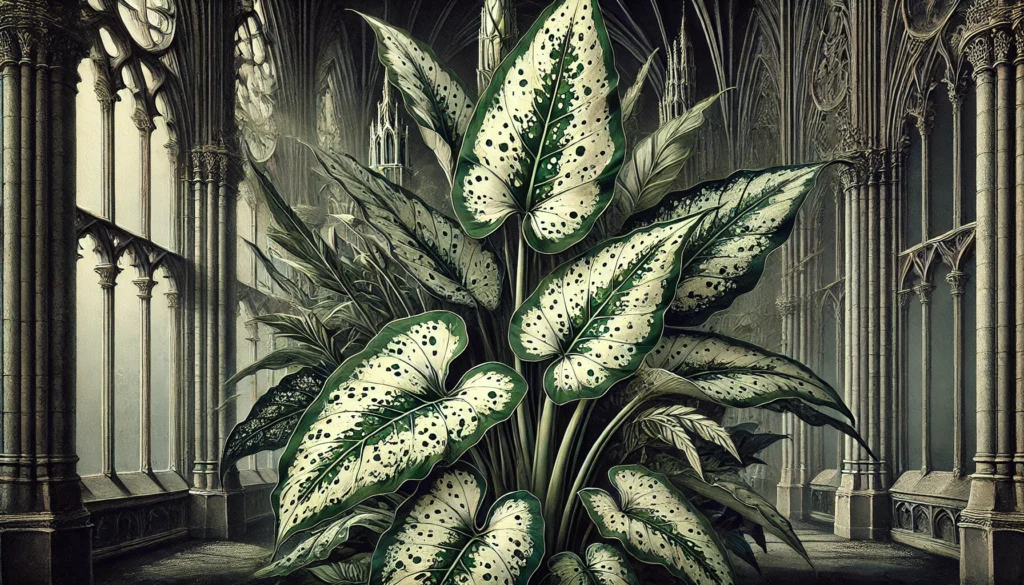

Home » Cat Plants » The Harm Spotted Dumb Cane Plant Can Cause to Cats

Dieffenbachia ‘Sparkles’, also known as Spotted Dumb Cane, is a popular houseplant known for its attractive foliage. However, this plant harbors a hidden danger for our feline friends. While not technically allergic to Dieffenbachia ‘Sparkles’ in the traditional sense, the plant is highly toxic to cats if ingested.
The plant contains calcium oxalate crystals and a protein called asparagine, which can cause severe irritation and swelling in a cat’s mouth, throat, and digestive tract.
Dieffenbachia ‘Sparkles’ is commonly found as an indoor ornamental plant in homes and offices.
Ingestion may cause mild gastrointestinal upset, but is generally not life-threatening.
Ingestion can result in mild symptoms like vomiting, diarrhea, or drooling. Rarely fatal but may require veterinary care.
Eating these plants can lead to more pronounced symptoms like abdominal pain, lethargy, or difficulty breathing. Veterinary intervention may be necessary.
Ingesting even small amounts can cause severe symptoms like organ damage, seizures, or cardiac failure without rapid treatment.
All parts of these plants are extremely poisonous to cats and can quickly lead to death, even with immediate veterinary care.
** Please note: Please note that toxicity level can vary based on the amount ingested and the specific cat. It's always best to keep these plants completely inaccessible to cats and seek immediate veterinary care or call the poison hotline if you suspect your cat has ingested any part of a toxic plant.
If your cat has ingested any part of a Dieffenbachia ‘Sparkles’ plant, they may exhibit a range of symptoms due to the toxic substances present in the plant. These symptoms can include:
If you suspect your cat has consumed any part of a Dieffenbachia ‘Sparkles’ plant, it is crucial to seek veterinary attention promptly.
When you bring your cat to the veterinarian with suspected Dieffenbachia ‘Sparkles’ poisoning, they will likely follow these steps to diagnose and treat your feline friend:

A: Yes, Spotted Dumb Cane is toxic to cats. It contains calcium oxalate crystals, which can cause severe oral irritation, vomiting, and difficulty swallowing.
A: If a cat eats Spotted Dumb Cane, it may experience symptoms such as drooling, vomiting, and pawing at the mouth. Quick veterinary intervention is necessary to prevent further complications.
A: Yes, all parts of the Spotted Dumb Cane plant, including the leaves and stems, are toxic to cats. These parts contain harmful substances that can lead to serious health issues.
A: Even small amounts of Spotted Dumb Cane can be harmful to cats. Ingesting any part of the plant can result in toxic reactions, so it’s important to keep it out of reach.
A: While Spotted Dumb Cane poisoning is rarely fatal, it can cause significant health problems in cats. Immediate treatment is essential to alleviate symptoms and ensure recovery.
A: If your cat ingests Spotted Dumb Cane, contact your veterinarian immediately. Early intervention can help reduce the toxic effects and protect your cat’s health.
Dieffenbachia ‘Sparkles’ is a cultivar of the Dieffenbachia genus, which belongs to the Araceae family. The genus is named after Joseph Dieffenbach, a German botanist who lived in the 19th century. Dieffenbachia plants are native to the tropical regions of the Americas, ranging from Mexico to Argentina.
Dieffenbachia ‘Sparkles’ was developed as an ornamental cultivar, prized for its striking foliage with cream-colored spots on green leaves. The plant gained popularity in the 1970s and has since become a common houseplant worldwide, despite its toxic properties.
Please note: The information shared in this post is for informational purposes only and should not be considered as veterinary medical advice.
🐾 A hilarious or heart-melting cat video
🐾 Our latest paws-on review of a cool cat toy